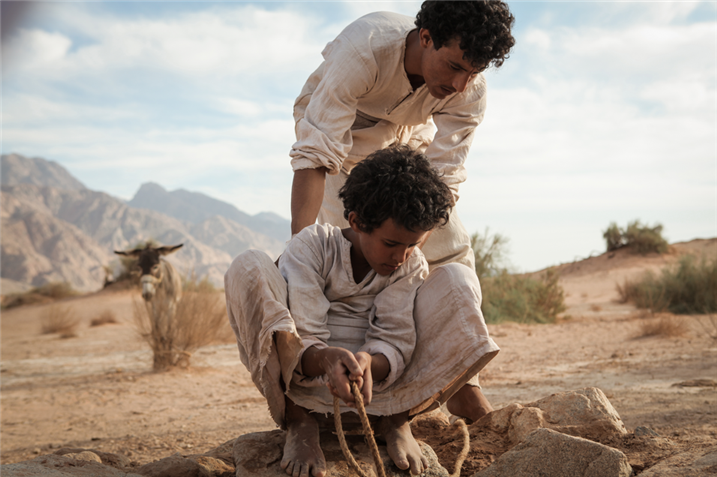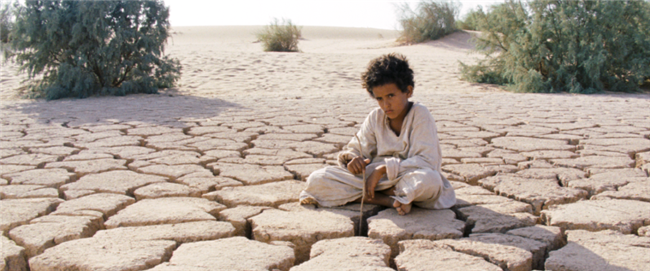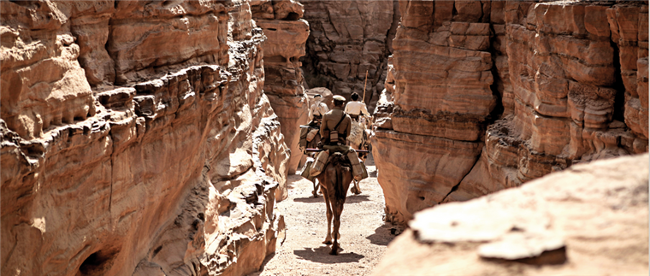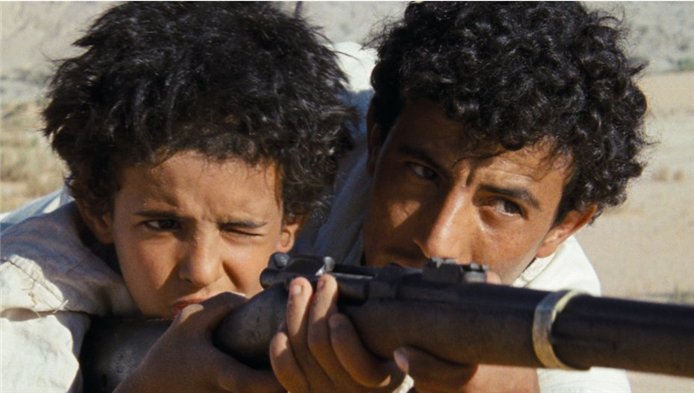1-1-16
Naji Abu Nowar’s Theeb: For the Very First Time
By Diane Sippl

He who swims in the Red Sea cannot know its true depth.
And not just any man, Theeb, can reach the seabed, my son.
In questions of brotherhood, never refuse a guest.
Be the right hand of the right when men make their stand.
And if the wolves offer friendship, do not count on success.
They will not stand beside you when you are facing death.
A wolf in sheep’s clothing
Sinister outlaws call him “little doggie,” but his name means “Wolf” — Theeb, the ten-year-old boy who faces off with marauders, freedom fighters, and hired killers alike in the desert that is Arabia in 1916. Theeb is a film composed with such remarkable symmetry that it plays like a ballad, not of the Old West of cowboys and sheriffs but of the Old East of nomads, Turks and Brits. Theeb is not their little pet but their prey, and how he comes to earn his name appears before our eyes in stanzas and refrains built on repetitions and reversals of situations and images.
Other than the one-line inter-title of date and place, writer-director Naji Abu Nowar doesn’t give us the so-called facts of the setting as Theeb opens; instead he personalizes them, all the more important for those who feel they know the history (of Arabia as subjugated by the Ottoman Empire for 400 years following 1500 years of rule by the Roman Empire, of the Bedouin culture and its revolutionaries, and of Britain’s success in co-opting them to conquer the Turks, only to betray the Bedouins in usurping power and resources — of the types of real reasons for World War I). What we do hear is what Theeb hears, beginning with his thoughts at the graveside of his father, a beloved sheik in a lineage of shrewd and skillful guides.

A Bedouin boy
It’s impossible not to watch Theeb as a boy’s adventure story, so spellbinding are its events and so chock-full of surprises is its narrative, starting with the disarming appearance from the black of night of a blond English Army officer at Theeb’s family tent where Marji, the man’s Arabian escort, knows that according to Bedouin custom, they will be received with hospitality that extends to guiding the foreigner to his destination, a Roman-era well along the old pilgrim route. The escapades begin when a disobedient Theeb steals away on his donkey to follow them. Hussein, his adult brother who leads the expedition, has already tried to initiate the boy into men’s work in the desert — shooting a hunting rifle, slitting a goat’s throat to provide a meal for the guest, and then, when both failed, wrestling, Hussein playfully holding Theeb over a well, threatening to drop him. At target practice, Theeb wraps his leg around Hussein’s as the two brothers lie in the sand and aim the rifle, as if the extra limb would give Theeb the leverage he needs against the forward-flying bullet. But the rifle’s not loaded. “No bullets ‘til you aim straight,” heckles Hussein. Theeb may still be a small boy who calls out to his big brother constantly by his nickname, ‘Sein, but he is fearlessly independent. Still, can his curiosity and courage hold up as we, through Theeb’s eyes and ears, discover another layer to the film, the historical impact of modernization on the traditional rhythms of Bedouin life?
In Theeb’s world, an age-old protocol of brotherhood for survival is etched in the very desert sand, but the visitors to the encampments are now strangers from far countries at war with each other, and we feel the weight of their demands on a massive scale. For all Theeb’s intimacy, the film is an epic, a classic of World War I’s conflicts at a remote outpost. Like an artisan potter “throwing” clay on his wheel, Naji Abu Nowar centers and pulls and turns a handful of icons with an expert’s finesse: each holds volumes of individual experience, tribal ethos, and world-historical drama.

Icons
Theeb bobs along on the back of his brother’s camel, his pint-size body at an uphill angle, his little legs barely able to straddle the animal’s girth. Insouciant as the camel is, its lower jaws swaying from left to right as it gnaws nonchalantly on desert weed, the creature is the livelihood of the nomad. “They take our camels and we die,” Hussein cautions Theeb in a dire moment. And raiders do just that, leaving Theeb alone in the canyon where the thunder of gunfire ricochets off the rocks and unseen voices jeer and chant in the black night. A day later a camel turns up as Theeb’s chance for life. Its dry, crusted, wart-like knees bend and dump a man in the sand. He looks half-dead, so Theeb grabs his buzzard carcass for a vessel to drink from the well, and he grabs his gun. “Go ahead and shoot, get it over with,” taunts the man… “You don’t need me? The trail is clear. Take my camel as blood money.” If only Theeb could…
The boy knows who the man is, and worse, he knows he needs him. The same goes for the man, who now requires Theeb to use the same knife that would slit a goat’s throat to pick a bullet from the man’s wounded leg, just as that same knife could be the one that cut the rope that left Theeb down a well, the same well that he now drinks from to survive. For this stranger, survival is also money. Theeb has snatched the man’s stash, but what about the wooden box that he clearly stole from the Englishman? Hussein said it was where the officer kept his gold coins. Unbeknownst to Theeb, that box has more to do with the field of corpses along the train tracks.

What’s an Englishman?
Near the culmination of this young boy’s adventure, an armed revolutionary on horseback interrogates him when the stranger who drives Theeb by camel, accosted, claims he got his pistol in Egypt from an Englishman. “Have you seen an Englishman?” asks the revolutionary, and Theeb replies, “What’s an Englishman?” He’s bluffing, but until a few days ago, this would have been a legitimate response. Why would a pre-teen Bedouin boy in 1916 have met with anyone outside his remote desert habitat where only the men ventured away from the family tent. His sheik father, very recently deceased, was admired far and wide as the foremost guide of pilgrims to Mecca, but that was in the days of the caravans. Now the railway built by the Turks to extend the Ottoman Empire has killed off that custom along with the traditional way of life of the many Arabic nomads who fought to protect and preserve it. “It’s a month to Mecca by camel and only a week by train,” the stranger tells Theeb, without knowing it’s the journey that counts.
The values, always the last to die off, still survive. “The departed never return,” advises the stranger as Theeb lingers over his brother’s new grave, as if this enemy would join the list of Theeb’s mentors. But the young pup knows that the departed mean everything, and that’s why he makes the decision he does in the film’s final showdown. This man makes one mistake worse than all the others, off-handedly telling the Turkish station officer that he is a pilgrim guide and that Theeb is his son. Moments later Theeb says it right. “He killed my brother,” Theeb announces, when it comes down to it. And now it’s Theeb’s words that will echo through the desert canyons, over the rails of the “iron donkey,” and chill the night sky.
He killed my brother
Theeb is about more than structure and style; it is conflict — between boyhood and manhood, brotherhood and nationhood, tribal elders and foreign monarchs, spiritual pilgrimage and the steam locomotive, ethos and “civilization,” integrity and betrayal, “underdevelopment” and “development.”
“Go home,” an Ottoman official tells Theeb at the end of the film. Now where would that be? The train has arrived, heaving black soot into the pristine desert sky, and it traverses the screen in a wide shot from right to left. Theeb’s camel approaches the tracks from the left foreground, stands between them in close-up, and turns to cross them, heading in a perpendicular line straight up the screen in a long shot of the distant mountains.
In his Director’s Statement, Naji Abu Nowar describes the central conflict of the film:
“In Bedouin law, if a stranger arrives at your tent requesting refuge, you must grant him protection until the threat can be peacefully resolved. This is known as the law of Dakheel… a sacred duty … no matter what the circumstance. Indeed, there are many stories of a host granting protection to his guest only to discover the Dakheel has killed a member of the host’s own family. But surprisingly this will not deter the host from his duty; he will protect the killer until peace has been made between them. A man’s reputation is defined by what he does in such difficult circumstances. The more impossible the situation, the more respect he receives for upholding the law.
Bedouin customs like this have grown from their environment, the desert… where you must be able to rely on the kindness of strangers to survive. The terrain is too harsh, water and food too scarce for selfish behavior. People need to help each other to ensure their mutual existence. It was the combination of a culture of cooperation for survival and a Dakheel-type moral dilemma that formed the initial idea for Theeb. What would happen if you were stranded with your worst enemy but needed their help to stay alive? How would this relationship develop?”

Writer-Director Naji Abu Nowar
Many lines in Theeb are resonant in an iconic way, and here the writer-director strikes the main chord of his film: Theeb is a pivotal moment, not only for a Bedouin boy coming of age under circumstances forced upon him, but for an Arabia that would soon be carved up by others and re-named as nation-states.
As shot by Director of Photography, Wolfgang Thaler in Super 16 with an anamorphic lens in Wadi Rum and Wadi Arabeh, Jordan, Theeb delivers writer-director Naji Abu Nowar’s encompassing view while never losing sight of its eponymous protagonist who, as if absent-mindedly, traces with a stick the deep crevices of the desert’s baked sand. Could they ever outlast the “legal” lines the British and the French draw at the end of the Arab Revolt and World War I? But that’s another film — in fact Naji Abu Nowar’s next project, the imposition of statehood upon the region by Western powers.
A classic under the stars
British-born Naji Abu Nowar, often based in his parents’ homeland of Jordan, will work again with the Bedouin community, home of all the cast (save Jack Fox, who plays Edward, the English officer) in Theeb. For that film, he insisted on actors who knew the Bedouin culture, spoke that dialect of Arabic, and had a truly Bedouin accent, which led him to draw his cast from the region of Wadi Rum. With neither a film industry in Jordan nor a cadre of thespians on hand, those he enlisted would be acting for the first time in Theeb.
From 250 locals who turned up at an open casting call, 11 were trained in workshops over eight months. Hassan Mutleg, who plays “The Stranger,” made a career in the Jordanian Army after a nomadic childhood and then settled in the region. Hussein Salameh, who plays Theeb’s older brother, grew up learning how to breed and race thoroughbred camels and works as a tour guide in Wadi Rum. His little cousin, Jacir Eid, whose superb performance etches Theeb indelibly on the memory of the viewer, is the only one who had to learn his role anew since he was born in the village, though he did follow his father as he guided tourists through their tribal territory. The boy, now 13, had to learn how to ride, track, hunt, and swim in the course of the film, so not only was his acting role as a novice authentic, but like the others, he now continues to act for the screen.
Theeb’s remarkably chiseled screenplay was written with Bassel Ghandour and edited by Rupert Lloyd, both of whom also produced the film. As Naji Abu Nowar’s impeccable debut feature, Theeb was Jordan’s submission this year for Best Foreign Language Film for the Academy Awards, and from the 81 films sent from around the world, Theeb was voted into the top five and won a nomination. Its profound storytelling, with both relevance and élan, recalls last year’s nominee from Mauritania by Abderrahmane Sissako, Timbuktu. Sissako is by now a seasoned filmmaker, possibly the continent’s best, but by the looks of Theeb’s first-time actor, the outstanding Jacir Eid, who carries the expansive film on his small shoulders, and its first-time filmmaker, Naji Abu’ Nowar, who won the Orizzonti Best Director award at the Venice International Film Festival, Theeb is a born classic and must have been cherished with pride at its premiere under the stars in Wadi Rum last March, where many were viewing a film for the very first time.
Theeb
Director: Naji Abu Nowar; Writers: Naji Abu Nowar, Bassel Ghandour; Producers: Bassel Ghandour, Rupert Lloyd; Cinematographer: Wolfgang Thaler; Editor: Rupert Lloyd; Music: Jerry Lane; Production Designer: Anna Lavelle.
Cast: Jacir Eid, Hassan Mutlag, Hussein Salameh, Jack Fox, Marji Audeh.
Color, Widescreen, 100 min. In Arabic with English subtitles.
All photographs courtesy of Film Movement.